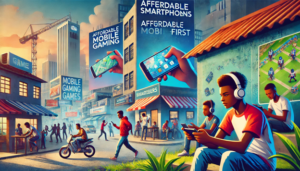How Gamification is Revolutionising Problem-Solving in Africa

Gamification has emerged as a powerful tool for addressing a wide range of challenges across various sectors in Africa. The approach leverages game mechanics and design to encourage participation, drive behavioural change, and improve learning outcomes.
In recent years, gamification has gained popularity on the African continent, with entrepreneurs and innovators using it to tackle social issues, promote financial literacy, and enhance learning outcomes. The potential of gamification to transform the way people learn, work, and live is becoming increasingly apparent.
One of the key benefits of gamification is its ability to enhance learning outcomes. By making learning more enjoyable, interactive, and engaging, gamification can increase motivation and retention of knowledge. It also promotes collaboration and healthy competition, which can improve social skills and confidence.
In Namibia, Tutaleni Ilonga, the founder of Tura Life Entertainment, advocates for the use of gamification to enhance learning outcomes. Ilonga believes that gamification can make learning more enjoyable and interactive, leading to better retention and understanding of concepts. He notes that gamification promotes collaboration and healthy competition among students, enhancing their social skills and confidence.
Gamification is also being used to tackle social issues, such as misinformation around COVID-19. NubianVR, a Ghana-based startup, developed a game called “COVID Warrior Quest” to educate and combat misinformation about the pandemic. The game’s engaging and interactive design makes it an effective tool for spreading accurate information.
Leti Arts, the Ghanaian game development company, has been at the forefront of exploring the potential of gamification in the agriculture industry. The company collaborated with the Canadian Queen Elizabeth II Diamond Jubilee Scholarships: Advanced Scholars-West Africa program – Netlinks project as a Research Placement Partner. The project was supported by McGill University and led by Professor Grace S. Marquis, which focused on researching innovative methods to increase the viability and impact of game-based advocacy for better agriculture and nutrition.
By embracing gamification in the agriculture industry, Leti Arts are paving the way for more innovative and impactful uses of this technology. With its focus on building communities and promoting social connections, gamification has the potential to transform the way we approach agriculture and nutrition in Africa. Leti Arts are at the forefront of this transformation, and we can expect to see more exciting developments from the company in the years to come.
Gamification is also proving to be an effective tool for healthcare. In Kenya, a startup called mTiba uses gamification to encourage patients to adhere to their medication regimens. The platform offers rewards and incentives to patients who take their medication as prescribed, improving adherence rates and ultimately leading to better health outcomes.
Overall, gamification is proving to be a valuable tool for addressing various challenges on the African continent. With more African countries embracing this approach, it is likely that gamification will become even more widespread in the future. As African entrepreneurs and innovators continue to explore the potential of gamification, it is clear that this approach has the potential to transform the way we learn, work, and live.
In conclusion, gamification has become an essential tool for addressing various challenges in Africa. By leveraging game mechanics and design, gamification is proving to be an effective tool for engaging and motivating people across various sectors. The success of gamification in Africa shows that innovative approaches to problem-solving can have a significant impact on the continent’s development. It is clear that gamification has the potential to transform the way people learn, work, and live in Africa, and its benefits are likely to be felt for years to come.






